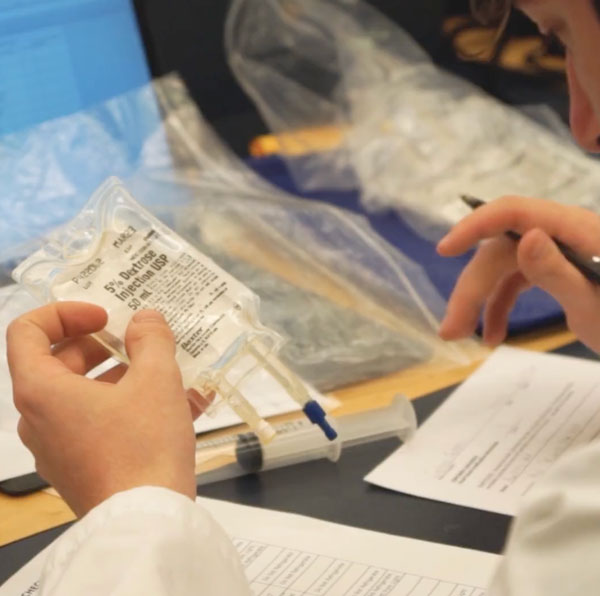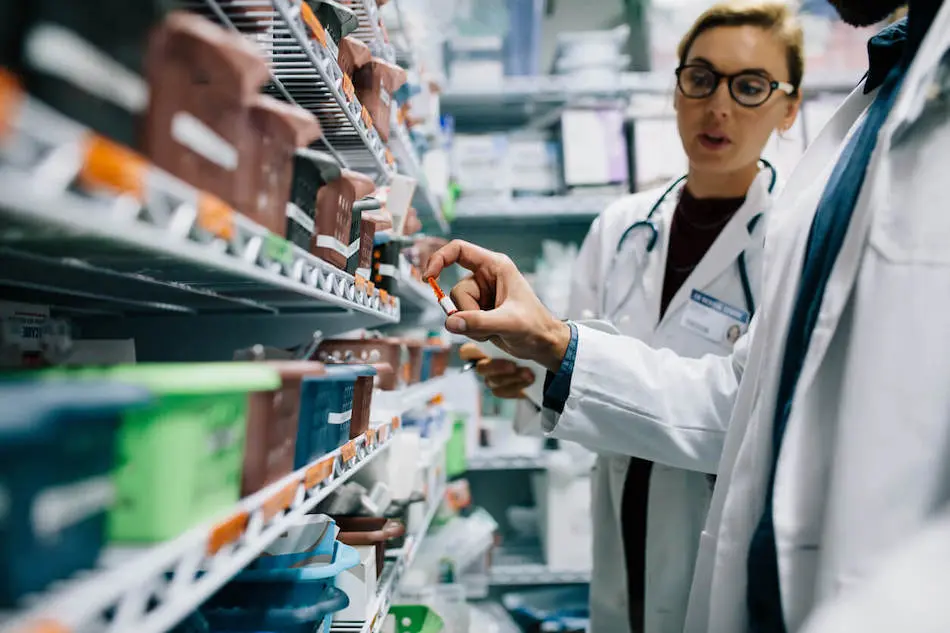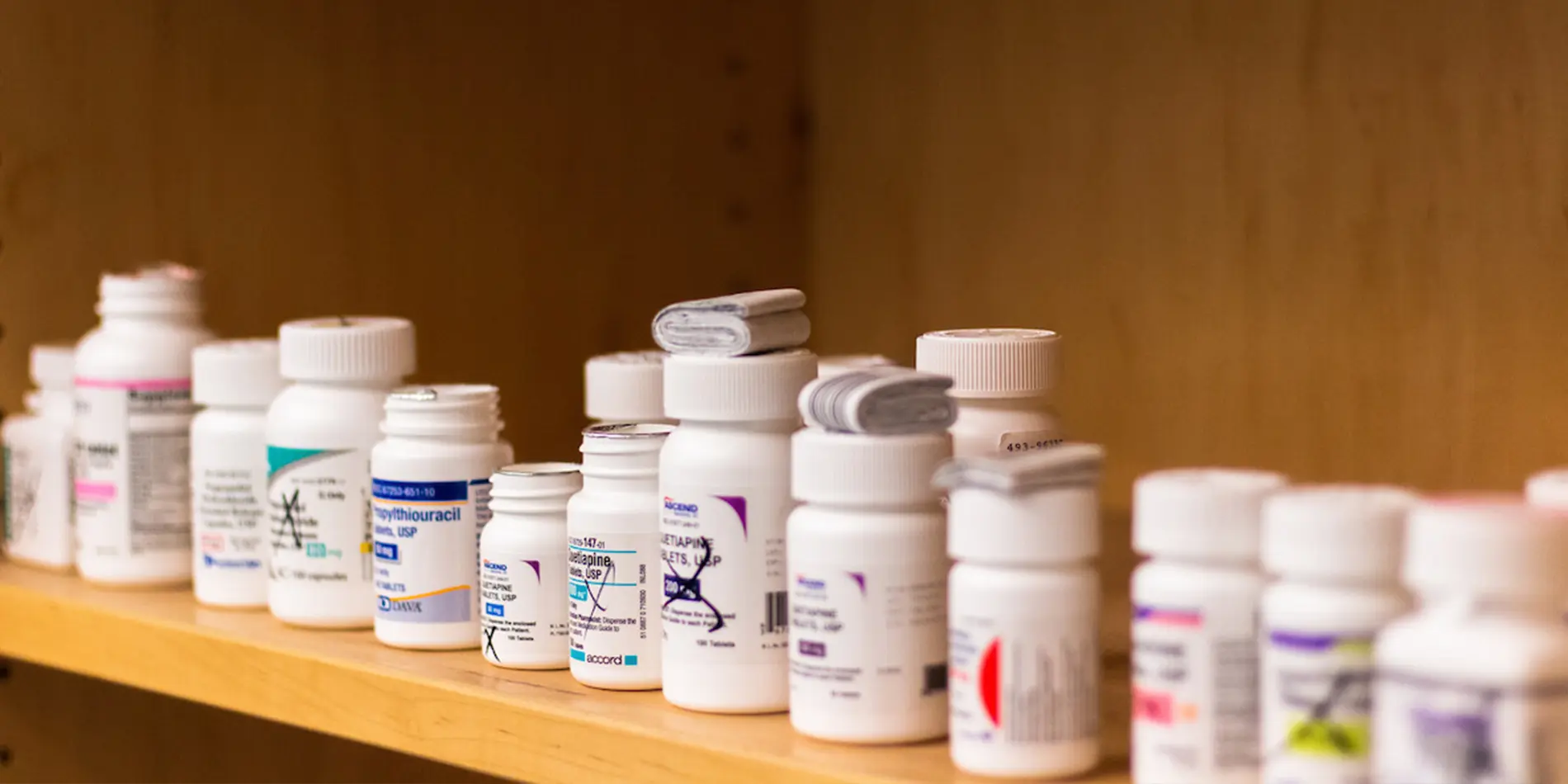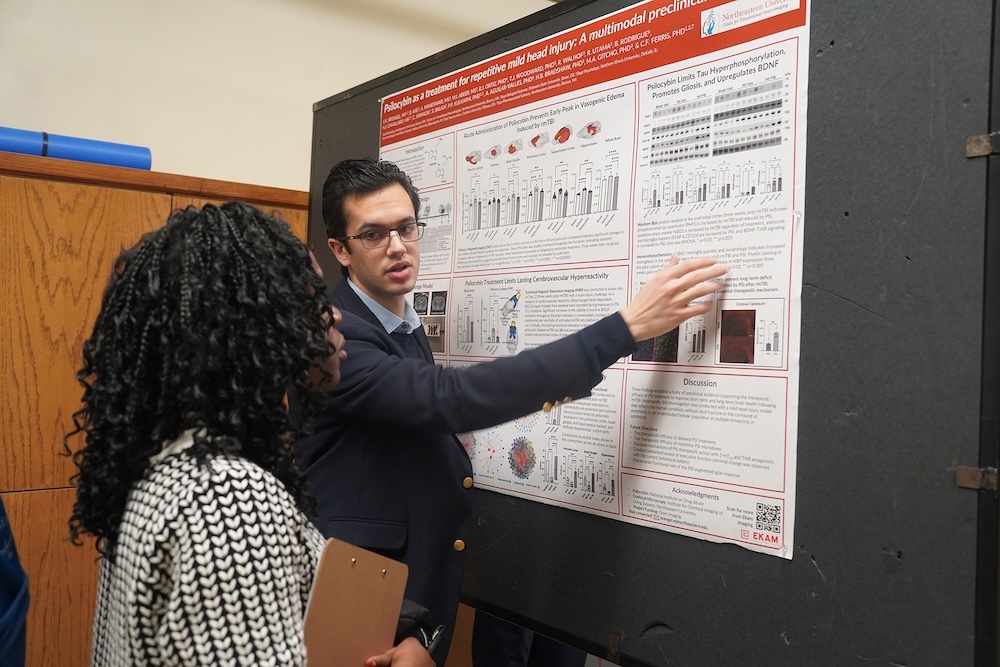Are you looking to continue your journey toward a career in the pharmaceutical industry? With so many options, it’s essential to choose the right path that aligns with your long-term goals. Two prominent roles within the industry are pharmacists and pharmaceutical scientists, both of which offer rewarding careers with different responsibilities, work settings, and educational requirements.
Deciding between these paths early on can help you focus your efforts and invest in the right graduate education to reach your professional aspirations. This article will help you understand the key differences between a pharmaceutical scientist vs. pharmacist, so you can confidently choose the best career path for you.

Career Guide
Learn how a PharmD can give you the skills for success in the industry.

What Is a Pharmacist?
A pharmacist is a healthcare professional specifically trained to be a medication expert. A large part of their role includes educating patients on the risks of medications and instructing them on how to self-administer their medications to ensure proper use.
Pharmacists collaborate with a wide range of healthcare providers to ensure patients receive the correct treatments and dosages. As a result, in any instance where a patient may need medication, a pharmacist is included on the team to ensure patients receive the correct medication, for the right medical condition, at the correct dose, and without interactions with their other medications or medical conditions. This makes a pharmacist a critical member of the team to ensure the safe and effective use of medications, and is key to helping patients get access to affordable treatments.
If you’re interested in becoming a pharmacist, here are several skills the U.S. Bureau of Labor Statistics recommends for success in the field:
- Analytical Skills: Pharmacists must analyze patient needs, medication interactions, and insurance coverage to ensure safe and effective treatment.
- Communication Skills: Clear communication with patients is essential for explaining medication instructions and ensuring proper administration.
- Computer Skills: It’s important for pharmacists to have a thorough understanding of how to use electronic health records (EHRs) to effectively navigate today’s healthcare systems.
- Attention to Detail: Pharmacists must pay close attention to avoid errors that could result in harmful consequences for patients.
- Managerial Skills: From overseeing staff to managing inventory, these skills are key to successfully running a pharmacy.
What Is a Pharmaceutical Scientist?
Pharmaceutical science combines a broad range of scientific disciplines to identify drug targets in the body and design new drugs that act at those targets safely and effectively. Therefore, pharmaceutical scientists focus on drug discovery, studying how medications interact with the body, and developing therapies that are both safe and effective.
Aside from inventing new treatments, pharmaceutical scientists must also consider how the drug changes within the body and how the body changes the drug.
Some specific tasks involved in the role include:
- Designing and executing experiments to identify where in the body a drug should act to treat a disease effectively
- Collecting and analyzing data
- Collaborating with interdisciplinary team members
- Testing and optimizing new drug compounds for safety and efficacy
- Running experiments to determine how a drug functions
Although pharmaceutical scientists don’t interact with patients directly, they play an essential role in the healthcare system by developing treatments that eventually reach patients and improve health outcomes. In fact, their work in the lab helps bring innovative therapies to life related to combatting public health crises like COVID-19 and cancer.
To help you determine which path is right for you, here’s a closer look at the four key differences between a pharmacist vs. pharmaceutical scientist.
Pharmacist vs. Pharmaceutical Scientist: 4 Key Differences
1. Responsibilities
The primary difference between a pharmaceutical scientist and a pharmacist is their roles within healthcare and the pharmaceutical industry.
For example, pharmaceutical scientists focus on the discovery, development, and testing of new drugs. They work primarily in research laboratories, conducting experiments to uncover how drugs interact with the body and how these drugs can treat diseases. Their day-to-day responsibilities include designing experiments, analyzing data, and collaborating with other scientists to innovate and improve medical treatments.
On the other hand, pharmacists are directly involved in patient care, ensuring medications are administered safely and effectively. Rather than creating new medications, pharmacists primarily oversee the correct dispensing of existing ones, educating patients on proper usage, potential side effects, and interactions with other medications. They play a key role in advising both patients and healthcare professionals on the optimal use of medications to achieve the best outcomes.
2. Education
The educational pathways for pharmaceutical scientists and pharmacists also differ significantly.
For one, pharmaceutical scientists typically pursue advanced degrees in pharmaceutical science, chemistry, or related fields, and many positions in the industry require a master’s degree or doctorate. These advanced degrees prepare scientists to work in research and development roles, where they apply their expertise to complex problems in drug formulation, pharmacology, and biochemistry.
However, some entry-level positions in the pharmaceutical industry may be available to individuals with only a bachelor’s degree, particularly in roles that focus on laboratory support or technical assistance.
In contrast, pharmacists must complete a Doctor of Pharmacy (PharmD) degree from an ACPE-accredited program. In addition to their PharmD, pharmacists are required to complete at least 1,500 hours of practical experience through internships or clinical rotations. After completing their educational requirements, pharmacists must pass the North American Pharmacist Licensure Exam (NAPLEX) as well as a state-specific law exam to become licensed to practice.
The more structured educational requirements for pharmacists reflect their direct involvement in patient care and the need for comprehensive knowledge of pharmacology, drug interactions, and patient communication.
3. Work Setting
Pharmaceutical scientists and pharmacists work in very different environments. Pharmaceutical scientists are typically found in laboratories, research centers, or pharmaceutical companies, where they spend their time developing and testing new drug compounds. They may also work for private pharmaceutical companies, biotechnology firms, or government agencies such as the Food and Drug Administration.
Pharmacists, in contrast, work in healthcare settings where they interact directly with patients. They can be found in community pharmacies (e.g., CVS, Walgreens), hospitals, clinics, or long-term care facilities, where their primary role is to dispense medications, counsel patients, and provide healthcare advice. Some pharmacists also work in specialized settings such as oncology pharmacies, compounding pharmacies, or veterinary pharmacies.
4. Salary
Pharmacists typically earn higher salaries than pharmaceutical scientists, which reflects their direct involvement in patient care and the more rigorous educational and licensure requirements. The average annual salary for pharmacists is more than $136,000, whereas pharmaceutical scientists earn on average a little over $100,00 per year.
However, salary ranges can vary greatly depending on specific roles, geographic location, and experience levels.
Job outlook also differs though. The demand for pharmacists is largely driven by the healthcare system’s need for medication management and patient counseling services. And while pharmacists enjoy relatively high earning potential, the employment growth rate is projected to be slower than average in the coming years due to the rise of mail-order pharmacies and automation in medication dispensing.
On the other hand, pharmaceutical scientists are seeing steady demand according to the U.S. Bureau of Labor Statistics, especially as pharmaceutical and biotechnology companies continue to innovate and expand drug discovery efforts. The growth of the pharmaceutical industry, combined with advances in personalized medicine and biotechnology, creates promising career opportunities for scientists specializing in drug development.
Pursuing A Pharmaceutical Career
Whether you are interested in becoming a pharmacist or a pharmaceutical scientist, Northeastern offers a range of programs designed to help you succeed. Both pharmacy and pharmaceutical science students benefit from Northeastern’s experiential learning model, gaining hands-on experience through co-ops, research opportunities, and mentorship from faculty with real-world experience.
In fact, within Northeastern’s Bouvé School of Pharmacy and Pharmaceutical Sciences, many students pursue jobs in pharmacy practice settings like post-grad residencies or fellowships, community, institution, specialty pharmacies, and more. These students are able to participate in on-campus labs and research projects, where students can work in drug design, synthesis, and study the latest drug and gene delivery approaches to combat COVID-19, cancer, infectious diseases, substance use, and various medical disorders.
To learn more about Bouvé’s pharmacy and pharmaceutical science degrees, explore the programs here or download our free guide to advancing your pharmacy career below.
Download Our Free Guide to Advancing Your Pharmacy Career

Career Guide
Learn how a PharmD can give you the skills for success in the industry.





